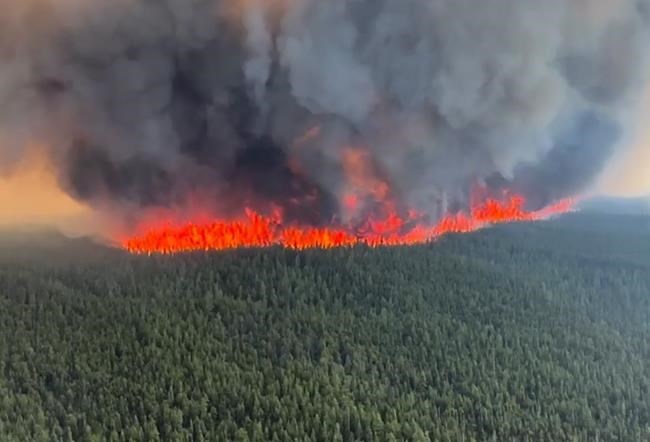VANCOUVER — An encroaching wildfire set off an immediate evacuation order Thursday for residents of the British Columbia District of Tumbler Ridge, a community of 2,400 people in northeastern sa¹úŒÊŽ«Ãœ
The district said in a message issued by the sa¹úŒÊŽ«Ãœ Emergency Alert system that residents needed to leave the area immediately due to the West Kiskatinaw River Wildfire's threat to human life.
The wildfire was only discovered on June 6 but has grown to 96 square kilometres in size.
Joline Couture, a Canadian Ranger living in Tumbler Ridge, said in an phone interview that smoke was heavy as she prepared to go door-to-door to ensure people were aware of the alert and had started to leave.
"We're remote, surrounded by forests all over. I think the town is well rehearsed on how to take fire orders because there's no chaos, there's no speeding," she said. "It seems that everybody is remaining calm."
Couture said the remote community is surrounded by forests so lightning fires are "bound" to happen, but hopes the wildfire will be suppressed before it reaches infrastructure.
A BC Wildfire Service advisory said the fire near Tumbler Ridge fire was caused by lightning and continues to spread aggressively.
It isn't responding to suppression efforts, the advisory said.
The statement from the District of Tumbler Ridge said the evacuation order includes all residents of the district and those at properties at Bearhole Lake. It said evacuees should leave via Highway 29.
The evacuation order came just as government and BC Wildfire Service officials were holding a news conference about wildfire activity in the province.
Emergency Management Minister Bowinn Ma said the area burned this year had already exceeded the total amount burned in 16 out of the last 20 wildfire seasons.
She said 382 wildfires have burned a total of 5,205 square kilometres since April 1.
"We've also seen that heat events are becoming more frequent and projected to become more severe due to climate change. Heat is now a part of our reality and it is critical that British Columbians understand what they can do to protect themselves and their loved ones if these events happen," Ma said.
Neal McLoughlin, superintendent of predictive services for the BC Wildfire Service, said he's concerned about the start of the fire season.
"It is quite alarming to see this amount of area burning this early in the season and it certainly doesn't bode well for the remainder of this summer," he said.
Lightning-caused fires are one of the service's biggest concerns this season, he said.
"We typically see lightning start in the later part of May and really pick up in the month of June and through the rest of the summer," he said.
"We could get scattered lightning and at a slower pace or we could see a big weather system change that brings widespread lightning all at once, and those are very difficult situations to fire agencies where there's more fire than we may be able to respond to."
Matt MacDonald, BC Wildfire Service's lead fire weather forecaster, said 16 communities in the province had experienced their hottest and driest May on record. This, he said, caused a fast snowmelt and left more "fuels" available for ignition.
"We've melted that snow three to four weeks earlier than normal, and again, as we approach the peak of lightning season, those fuels are ready to be ignited."
An unusually warm summer is expected across sa¹úŒÊŽ«Ãœ, MacDonald said, and though some rain is predicted for sa¹úŒÊŽ«Ãœ next week, forecasters still anticipate a "very dry June."
"It's not going to be enough rainfall to alleviate these deep, persistent drought conditions right across the province," he said.
McLoughlin said the wildfire service will need to call on all its resources, since help from outside sa¹úŒÊŽ«Ãœ will likely be limited.
"All agencies across sa¹úŒÊŽ«Ãœ are busy this year, and there is a real shortage of resources for sharing," he said. "And so, this could be a year where we have to really dig deep and use the resources we have here in sa¹úŒÊŽ«Ãœ to address our situation."
The Peace River Regional District also expanded its evacuation order for the West Kiskatinaw River wildfire again Thursday. The alert said the order now includes areas north of the Tumbler Ridge municipal boundary, between Highway 29S and Highway 52N, including Moose Lake and Moose Lake Forestry Service Road.
Smoke from wildfires prompted special weather statements about air quality in several areas of the province, including the Nicola, Fraser Canyon, North Columbia, Yellowhead, Williston, Peace River and Fort Nelson regions.
Environment sa¹úŒÊŽ«Ãœ says the smoky skies bulletin will be in place for the next 24 to 48 hours.
An air quality advisory issued Wednesday by the Metro Vancouver Region District has been lifted.
The district said the improvement on Thursday was due to favourable winds and cooler temperatures.
However, it said there was potential for the smoke to return as two out-of-control wildfires burn near Harrison Lake, 150 kilometres east of Vancouver.
This report by The Canadian Press was first published June 8, 2023.
Brieanna Charlebois and Darryl Greer, The Canadian Press



